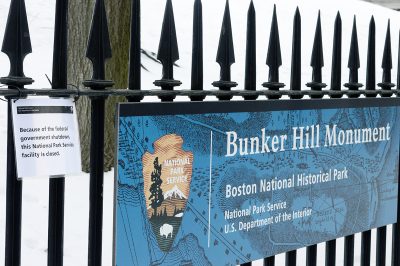
VIGUNTHAAN THARMARAJAH/ DAILY FREE PRESS STAFF
The United States’ partial government shutdown, which began on Dec. 22, 2018, has halted numerous academic opportunities across Boston University, an institution that receives federal funding.
Jennifer Grodsky, BU’s vice president for federal relations, wrote in an email that a number of university faculty and students have been affected by shuttered federal agencies.
“BU researchers who are awaiting word on whether they have won federally-funded research grants from federal agencies like the National Science Foundation and NASA, which are currently closed, are also impacted,” Grodsky wrote.
Students participating in internships based in Washington, D.C., such as at the U.S. Department of Justice and the Environmental Protection Agency, cannot begin until the federal departments reopen, Grodsky wrote.
“If the shutdown continues,” Grodsky wrote, “federal science agencies will delay their peer review of research proposals and will struggle to address the backlog of research grant applications when they reopen.”
This will lead to delays in awarding new grants, which BU faculty and students rely on to conduct their scientific work, Grodsky wrote.
Masha Kamenetska, an assistant professor of chemistry and physics, is conducting research to measure the electron conductivity of DNA molecules. She said her funding is still active during the shutdown, as it was allocated in the budget earlier this month, but that a grant she submitted for review is being put on hold by the NSF.
“Delaying and shutting down all these federal agencies is not good for anyone and certainly is not good for science,” Kamenetska said.
Additionally, Kamenetska said that she proposed Monday to purchase an optical tweezer, a scientific instrument that uses a laser beam to manipulate small particles, for the science department to be shared among professors. If approved, the project would begin to receive funding in July, but with the delay in the shutdown, the starting date is unknown.
“All of this throws delays and uncertainty into our work,” Kamenetska said.
Although this is only a partial shutdown, Grodsky wrote that she was worried about the consequences of its record length, which has now lasted for 33 days.
“There was a 16-day government shutdown in 2013, which unfortunately took scientific agencies months to recover from,” Grodsky wrote. “While this shutdown is partial – many agencies are still operational – it is unprecedented in its length. I am very worried that even when the affected agencies reopen, it will take quite some time for their operations to return to normal.”
Glynn Holt, an associate professor of mechanical engineering, said NSF asked him to serve as an investigator on a panel that reviews proposals in his field.
The day-long event was scheduled to take place in Washington, D.C., this Friday. However, Holt said the panel was canceled due to travel issues and websites being shut down, which render the proposals inaccessible.
Several years ago, Holt started a company called Levisonics, which has developed a method to monitor blood coagulation in real-time for patients. Just before the shutdown, he said that he was notified by the NSF that Levisonics was recommended to receive funding from a Small Business Technology Transfer grant.
“Recommended for funding does not mean awarded,” Holt said. “And then the shutdown happened, so now we can’t plan. Plans to allocate funding are now on hold, including kickoff meetings, bootcamps and hiring.”
BU spokesperson Colin Riley said that although BU doesn’t deal directly with the federal government, the shutdown is beginning to affect state and local municipalities.
“When there’s a shutdown of this magnitude, it has a ripple effect,” Riley said. “I think everyone is affected in some way, but some much more than others.”
At this point, Riley added, he does not think any financial assistance to students would be affected by the shutdown.
Amelia Wolff, a freshman in the College of Communication, said she was disappointed with the conflict in Washington.
“I think it’s disappointing that they can’t find a way to work together, but I also think that holding the government hostage while you try to make a political point is just childish,” Wolff said.
Lauren Mister, a sophomore in the College of Arts and Sciences, said she has friends whose parents work in government offices in Maryland. Some are working without pay, she said, and some can’t go to work at all.
“It hurts so many more Americans than it does anybody else,” Mister said. “So, for me, it’s really just anti-American.”
Troy Gallerani, a CAS junior, said that he thinks that the shutdown will end with one side giving in.
“I think someone needs to concede at some point,” Gallerani said. “It will be have to be on the part of the Democrats. The personality of the president, he is very stubborn. The way that he negotiates is that he doesn’t.”























































































































